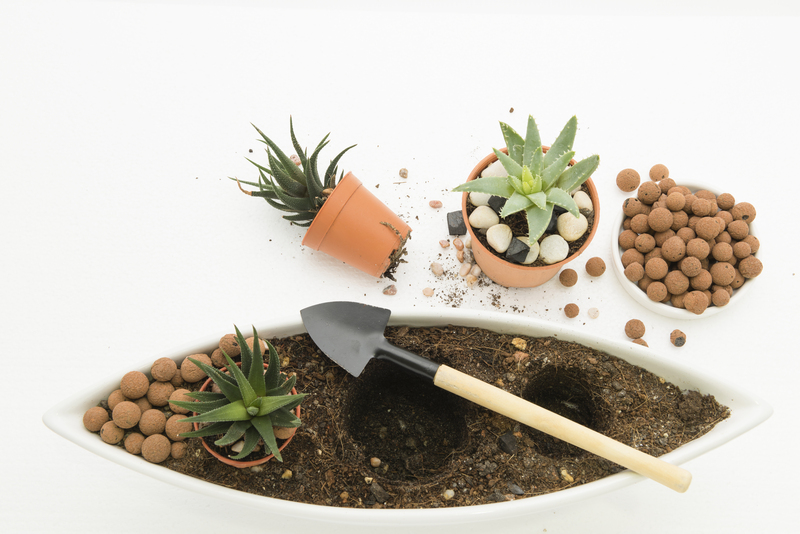Integrate Zen Garden Principles for a Peaceful Home
Posted on 20/06/2025
Integrate Zen Garden Principles for a Peaceful Home
Are you yearning for tranquility and balance in your living space? Integrating Zen garden principles for a peaceful home can transform your environment into a calming retreat. Drawing inspiration from traditional Japanese Zen gardens, you can cultivate serenity, focus, and aesthetic beauty throughout your house and outdoor areas. This comprehensive guide reveals how adopting Zen garden philosophies transcends landscaping, touching upon interior design, lifestyle, and mindfulness--helping you create a true sanctuary.

What Are Zen Garden Principles?
The Zen garden, or karesansui, originated in Japan as a meditative space characterized by its minimalism and symbolic design. It uses elements such as rocks, gravel, sand, and carefully placed plants to evoke natural landscapes. The philosophy behind these gardens is centered on simplicity, asymmetry, naturalness, and a deep connection to nature.
- Simplicity (Kanso): Eliminate the unnecessary and embrace what truly matters.
- Asymmetry (Fukinsei): Find beauty in irregularity and imperfection.
- Naturalness (Shizen): Celebrate organic forms and materials.
- Tranquility (Seijaku): Create spaces that provide inner stillness.
- Subtlety (Yugen): Invite contemplation through suggestion, not declaration.
These Zen garden principles can seamlessly be woven into interior and exterior design, promoting a peaceful home atmosphere that nurtures well-being.
Benefits of Applying Zen Garden Concepts at Home
- Promotes Relaxation: Minimalist, uncluttered design reduces mental noise.
- Encourages Mindfulness: Every element serves a deliberate purpose, inviting attentiveness.
- Supports Well-being: Connection with nature improves mood and health.
- Aids Focus: Calm spaces foster concentration for work or study.
- Enhances Aesthetic Appeal: The timeless style suits modern and traditional homes.
How to Integrate Zen Garden Principles for a Peaceful Home
1. Declutter and Simplify Your Space
The first step in creating a Zen-inspired peaceful home is practicing kanso, or simplicity. Clutter--whether physical, visual, or digital--creates stress and detracts from focus.
- Eliminate excess items: Donate or recycle anything not useful or beautiful.
- Open up negative space: Leave areas unadorned to encourage visual calm and mental clarity.
- Choose quality over quantity: Select a few meaningful decor pieces instead of many.
- Organize storage: Use baskets, cabinets, or drawers to keep surfaces clear.
A clutter-free environment is the foundation of serene Zen garden design--whether you're outdoors or indoors.
2. Embrace Natural Materials and Colors
Zen gardens use stones, sand, and plants, echoing nature's palette and textures. Your home can reflect this by incorporating:
- Wooden furniture: Opt for bamboo, teak, oak, or maple with a raw or matte finish.
- Stone accents: Add pebbles, stone planters, or a slate pathway for tactile interest.
- Textiles: Use cotton, linen, or wool in neutral or earthy tones such as beige, gray, taupe, moss green, and off-white.
- Natural light: Let in sunlight through sheer curtains and position mirrors to amplify brightness.
Integrating Zen garden principles means your home should feel anchored to the earth, soothing, and welcoming.
3. Create Flow and Asymmetry
Although symmetry can be pleasing, the Zen approach values fukinsei, or balanced irregularity. For a peaceful Zen home:
- Stagger decorative items: Group objects in odd numbers or slightly offset clusters.
- Vary heights and shapes: Combine tall plants with shorter vases or sculptures.
- Design pathways: If possible, use stepping stones or curved rugs to suggest movement and guide energy flow.
This ensures visual interest while supporting a tranquil, harmonious environment.
4. Incorporate Mindful Soundscapes
Sound plays a vital role in Zen-inspired peaceful living. Gentle, natural sounds encourage relaxation and reflection.
- Indoor water features: Tabletop fountains or wall-mounted cascades provide soft, flowing sound.
- Wind chimes: Bamboo or metal chimes outside a window evoke a meditative ambiance.
- Nature playlists: Play recorded rain, birds, or rustling leaves when you need to decompress indoors.
Choose calming sound elements that complement the sense of peace in your Zen-styled home.
5. Curate Minimalist Art and Decor
When selecting wall art or decorative pieces:
- Opt for abstract or nature-inspired themes. Ink brush paintings, pressed leaves, or minimalist sculptures create depth without distraction.
- Edit ruthlessly: Only display one or two focal points per room. Less is more in Zen aesthetics.
- Honor wabi-sabi: Showcase imperfect beauty--handmade ceramics, weathered wood, or timeworn textiles.
A peaceful Zen home environment values suggestion and subtlety, not visual overload.
6. Add Greenery Thoughtfully
Living plants purify the air and represent vitality, patience, and growth. You can evoke the spirit of a Zen garden by:
- Choosing easy-care species: Consider bonsai, bamboo, snake plants, or ferns.
- Grouping plants in odd numbers: Arrange three or five pots of varying heights for organic flow.
- Positioning near windows or quiet corners: Brighten reading nooks or resting places with greenery.
- Utilizing stone or clay planters: Ensure pots harmonize with existing decor, maintaining earthy textures.
Plants reconnect your home zen spaces with the rhythms of nature--a key concept in Japanese garden design.
7. Dedicate a Meditation Area
A personal meditation nook embodies Zen philosophy, becoming a central feature in any peaceful home. To create your sanctuary:
- Choose a quiet spot: Spare bedrooms, window alcoves, or even outdoor patios can serve as ideal backdrops.
- Use soft mats or floor cushions: Tatami, zafu, or poufs provide comfort without clutter.
- Add meaningful decor: A single candle, an incense holder, or a calming statue (like a Buddha) underscores the area's purpose.
- Separate visually: Use a shoji screen, potted plant, or bookshelf to set the space apart.
A designated Zen meditation zone invites daily moments of mindfulness, benefitting the entire household.
8. Foster Indoor-Outdoor Harmony
The boundary between home and garden can be softened, bringing nature indoors and extending living space outward. To integrate this approach:
- Use sliding doors or large windows: These allow sunlight in and provide views of your backyard or patio Zen garden.
- Maintain cohesion: Carry common materials--like stone or bamboo--between indoor and outdoor zones.
- Establish a Japanese-style entryway: Encourage "removing shoes" rituals and provide a space for guests to transition from the outside world.
- Create small outdoor Zen gardens: Even in urban locations, a patch of gravel, a few rocks, and a simple bench can set the scene for meditation and quietude.
Blurring the lines between inside and outside grounds your peaceful Zen home in natural serenity.
Zen Garden-Inspired DIY Projects for Home Peace
1. Tabletop Zen Sand Garden
Bring a slice of Zen tranquility to your workspace or living room with a mini sand garden:
- Find a shallow tray, sand, and a few smooth pebbles or rocks.
- Use a small rake (or a fork) to draw patterns in the sand, easing stress and promoting focus.
- Place the garden on your desk for moments of meditative pause during daily routines.
2. DIY Bamboo Water Feature
A gentle trickle of water not only cools the air but provides continuous Zen-style relaxation:
- Install a small recirculating pump in a ceramic bowl or stone basin.
- Use cut bamboo or natural stones as a spout or frame.
- Position in an entryway or patio corner where water sounds can soothe passersby.
3. Indoor Shoji Screens
Partition open-plan rooms or carve out reading nooks with lightweight paper or fabric shoji screens:
- Frame with wood or bamboo for authenticity.
- Opt for translucent rice paper or soft linen for optimal light diffusion.
- Personalize with subtle painted motifs, tying your decor to the Zen garden concept.
Maintaining a Zen Atmosphere: Habits and Mindfulness Practices
- Daily tidying: Spend five minutes resetting each room at the end of the day for sustained calm.
- Mindful rituals: Incorporate tea time, incense burning, or quiet journaling into your schedule.
- Open windows regularly: Fresh air supports both physical and mental clarity.
- Savor solitude: Embrace moments of silence to process and reflect, protecting your Zen-inspired peaceful home energy.
- Simplify commitments: Just as in decor, less is more when it comes to calendars and to-do lists.
By merging Zen garden concepts with intentional lifestyle choices, your home evolves from mere shelter into a transformative refuge.

The Science Behind Zen Garden Aesthetics and Calm
Research shows that environments echoing natural landscapes and minimalist design significantly reduce stress, lower blood pressure, and boost mood. The principles of Zen gardens--like uncluttered layouts, greenery, and natural materials--activate our relaxation response. Additionally, daily exposure to beauty and order (Shibui) enhances productivity and emotional regulation.
By purposefully shaping your surroundings with Zen garden-inspired interior design, you make it easier to unwind, concentrate, and feel at home in the full sense of the word.
Conclusion: Your Path to Tranquility
When you integrate Zen garden principles for a peaceful home, you nurture harmony, mindfulness, and authentic comfort. You don't need to recreate a traditional Japanese landscape; you simply need to echo its spirit--in your rooms, routines, and relationships. From simplifying clutter to curating calming aesthetics and fostering daily rituals, the Zen approach empowers your environment to support your highest self.
Start small, honor imperfection, and allow each choice to guide you toward serenity. As you embrace these peaceful Zen home design ideas and habits, you'll notice a subtle but profound shift: your abode becomes more than the sum of its furnishings--it blossoms into a sacred, restorative haven.
Ready to experience true tranquility? Begin applying these Zen garden principles for home peace today and see your cherished space transform, inside and out.

